| diagram | 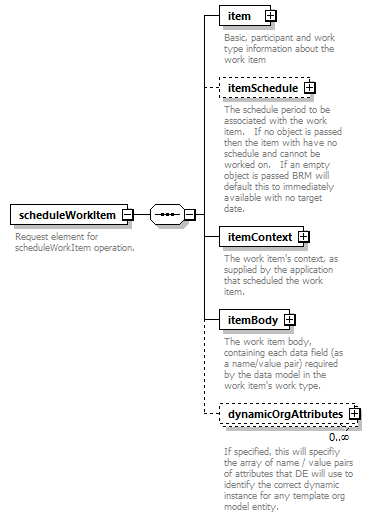 |
||
| namespace | http://api.brm.n2.tibco.com | ||
| properties |
|
||
| children | item itemSchedule itemContext itemBody dynamicOrgAttributes | ||
| annotation |
|
||
| source | <xsd:element name="scheduleWorkItem"> <xsd:annotation> <xsd:documentation>Request element for scheduleWorkItem operation.</xsd:documentation> </xsd:annotation> <xsd:complexType> <xsd:sequence> <xsd:element name="item" type="Item"> <xsd:annotation> <xsd:documentation>Basic, participant and work type information about the work item</xsd:documentation> </xsd:annotation> </xsd:element> <xsd:element name="itemSchedule" type="ItemSchedule" minOccurs="0"> <xsd:annotation> <xsd:documentation>The schedule period to be associated with the work item. If no object is passed then the item with have no schedule and cannot be worked on. If an empty object is passed BRM will default this to immediately available with no target date.</xsd:documentation> </xsd:annotation> </xsd:element> <xsd:element name="itemContext" type="ItemContext"> <xsd:annotation> <xsd:documentation>The work item's context, as supplied by the application that scheduled the work item.</xsd:documentation> </xsd:annotation> </xsd:element> <xsd:element name="itemBody" type="ItemBody"> <xsd:annotation> <xsd:documentation>The work item body, containing each data field (as a name/value pair) required by the data model in the work item's work type. </xsd:documentation> </xsd:annotation> </xsd:element> <xsd:element name="dynamicOrgAttributes" type="orgdto:XmlDynamicIdField" minOccurs="0" maxOccurs="unbounded"> <xsd:annotation> <xsd:documentation>If specified, this will specifiy the array of name / value pairs of attributes that DE will use to identify the correct dynamic instance for any template org model entity.</xsd:documentation> </xsd:annotation> </xsd:element> </xsd:sequence> </xsd:complexType> </xsd:element> |
element scheduleWorkItem/item
| diagram | 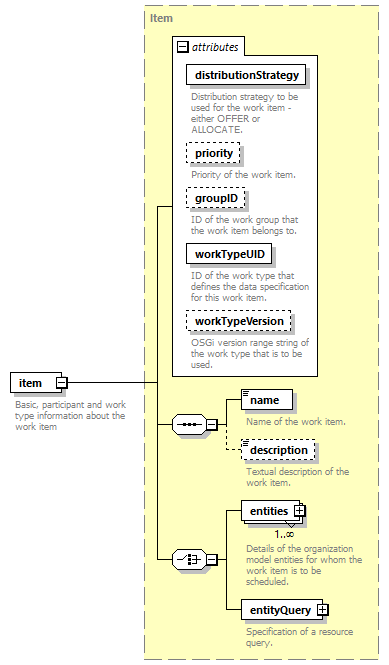 |
||||||||||||||||||||||||||||||||||||||||||||||
| type | Item | ||||||||||||||||||||||||||||||||||||||||||||||
| properties |
|
||||||||||||||||||||||||||||||||||||||||||||||
| children | name description entities entityQuery | ||||||||||||||||||||||||||||||||||||||||||||||
| attributes |
|
||||||||||||||||||||||||||||||||||||||||||||||
| annotation |
|
||||||||||||||||||||||||||||||||||||||||||||||
| source | <xsd:element name="item" type="Item"> <xsd:annotation> <xsd:documentation>Basic, participant and work type information about the work item</xsd:documentation> </xsd:annotation> </xsd:element> |
element scheduleWorkItem/itemSchedule
| diagram | 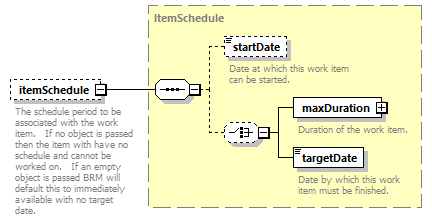 |
||||||
| type | ItemSchedule | ||||||
| properties |
|
||||||
| children | startDate maxDuration targetDate | ||||||
| annotation |
|
||||||
| source | <xsd:element name="itemSchedule" type="ItemSchedule" minOccurs="0"> <xsd:annotation> <xsd:documentation>The schedule period to be associated with the work item. If no object is passed then the item with have no schedule and cannot be worked on. If an empty object is passed BRM will default this to immediately available with no target date.</xsd:documentation> </xsd:annotation> </xsd:element> |
element scheduleWorkItem/itemContext
| diagram | 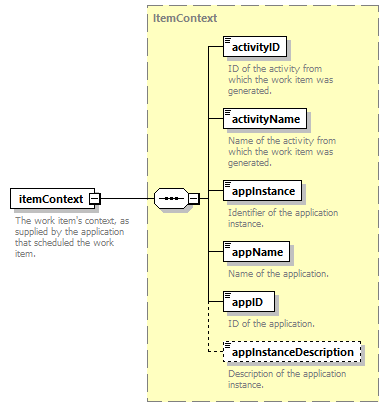 |
||
| type | ItemContext | ||
| properties |
|
||
| children | activityID activityName appInstance appName appID appInstanceDescription | ||
| annotation |
|
||
| source | <xsd:element name="itemContext" type="ItemContext"> <xsd:annotation> <xsd:documentation>The work item's context, as supplied by the application that scheduled the work item.</xsd:documentation> </xsd:annotation> </xsd:element> |
element scheduleWorkItem/itemBody
| diagram | 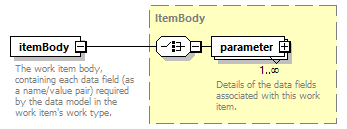 |
||
| type | ItemBody | ||
| properties |
|
||
| children | parameter | ||
| annotation |
|
||
| source | <xsd:element name="itemBody" type="ItemBody"> <xsd:annotation> <xsd:documentation>The work item body, containing each data field (as a name/value pair) required by the data model in the work item's work type. </xsd:documentation> </xsd:annotation> </xsd:element> |
element scheduleWorkItem/dynamicOrgAttributes
| diagram | 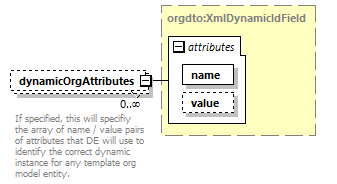 |
||||||||||||||||||
| type | XmlDynamicIdField | ||||||||||||||||||
| properties |
|
||||||||||||||||||
| attributes |
|
||||||||||||||||||
| annotation |
|
||||||||||||||||||
| source | <xsd:element name="dynamicOrgAttributes" type="orgdto:XmlDynamicIdField" minOccurs="0" maxOccurs="unbounded"> <xsd:annotation> <xsd:documentation>If specified, this will specifiy the array of name / value pairs of attributes that DE will use to identify the correct dynamic instance for any template org model entity.</xsd:documentation> </xsd:annotation> </xsd:element> |
WSDL documentation generated by XMLSpy WSDL Editor http://www.altova.com/xmlspy